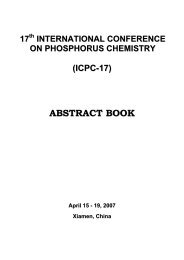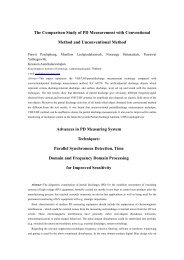New Modes of GPCR Signalling
New Modes of GPCR Signalling
New Modes of GPCR Signalling
You also want an ePaper? Increase the reach of your titles
YUMPU automatically turns print PDFs into web optimized ePapers that Google loves.
Isolation, Characterization and Anti-Cancer Activity <strong>of</strong> SK84, a Novel<br />
Glycine-Rich Antimicrobial Peptide from Drosophila Virilis<br />
Jie Lu*, Mu-ya Shu, Ming-lei Leng, Zheng-wang Chen<br />
Institute <strong>of</strong> Biophysical & Biochemistry, College <strong>of</strong> Life Science and<br />
Technology,Huazhong University <strong>of</strong> Science & Technology, Wuhan, 430074, China<br />
We report herein the isolation and characterization <strong>of</strong> a novel glycine-rich antimicrobial<br />
peptide purified from the larvae <strong>of</strong> Drosophila virilis. A range <strong>of</strong> chromatographic<br />
methods was used for isolation and its antibacterial activity against Bacillus subtilis was<br />
employed to screen for the most active fractions. The peptide, termed SK84 due to its<br />
N-terminal serine, C-terminal lysine and a total <strong>of</strong> 84 residues, was completed<br />
sequenced using RT-PCR cDNA cloning. SK84 contains a high level <strong>of</strong> glycine (15.5%)<br />
and a hexaglycine cluster motif in the N-terminal part. SK84 displayed antibacterial<br />
activity against the tested Gram-positive bacteria (Bacillus subtilis, Bacillus<br />
thuringiensis and Staphylococcus aureus), but had no effect on Gram-negative bacteria<br />
(Pseudomonas aeruginosa, Escherichia coli) and fungi (Saccharomyces cerevisiae,<br />
Candida albicans). SK84 had specific inhibitory effects on the proliferation <strong>of</strong> several<br />
cancer cell lines (Human leukemia THP-1, liver cancer HepG2, and breast cancer<br />
MCF-7 cells), but no hemolytic activity. The results from scanning electron microscopy<br />
observations revealed that SK84 killed THP-1 cells by destroying the cell membranes.<br />
Alignment results show that SK84 is a mature protein processed from the pseudoprotein<br />
GJ19999 from Drosophila virilis, and is very similar to several pseudoproteins from<br />
different Drosophila species. SK84 induces the apoptosis <strong>of</strong> HepG2 cells by stimulating<br />
the caspase-3 activation. Our results show that SK84 represents a novel glycine-rich<br />
peptide family in Drosophila species with antimicrobial and anti-cancer cell activities.<br />
Key Words:antimicrobial peptide; glycine-rich peptide; Drosophila virilis;<br />
anti-cancer-cell activity;apoptosis.<br />
*Corresponding author to:<br />
Tel: 86-18971142265;Fax: 86-027-87792024;E-mail:lujie.jane@163.com












